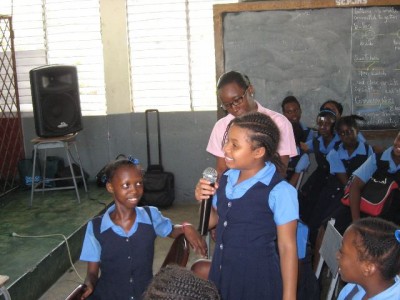
As we approach the end of the year, it is only fitting to reminisce over the activities on which we’ve embarked over the past 12 months. As we observed in an earlier blog post, Jamaica’s DJs Sound Off, our aim as an organization isn’t only to regulate, but also to educate. In addition to speaking with DJs, broadcasters, cable operators and local cable channel operators, we also reached out to a key social group—the youth of our nation.
As the late Whitney Houston indicated in song, “…. the children are our future. Teach them well and let them lead the way.” These words illustrate a view long held by the Commission. By enforcing the Television and Sound Regulations, 1996, and the Children’s Code for Programming (2003), our aim is to protect children from exposure to mature content. But enforcement without education and empowerment is not sustainable. In order to create an empowered, responsible, and media literate generation of youth, it is first necessary to ensure that they understand the reasons why these laws must be enforced, as well as the consequences of an unregulated electronic media landscape.
Additionally, as we expect Jamaica to be fully digitalized by 2015, we sought to also explain the implications of the digital switchover in terms that young people could relate to. Additionally, as changes in media have also led to the rise of home-grown ‘Digital Technology Stars’—Jamaican entrepreneurs such as Gordon Swaby, who founded learning website Edufocal, and Saadiq Rodgers-King, who co-founded social networking site Hot Potato—we wanted to emphasize to young people that technology is the great enabler. We live in a world in which technology is transforming more media consumers into creators—thus, we aim to inspire young people to think big, and to motivate them to achieve their dreams.
We therefore trekked across Jamaica, holding discussions with Primary, Junior High and High schools across our country. The response was greater than anything we could have ever imagined. “The kids were spellbound,” observed Ms. Valerie Gavin, a teacher of Communication Studies, English Language and Literature at St. Elizabeth Technical High School. “They stayed right into the end, and even when lunchtime came they were still sitting in their seats.” Shyrel-Ann Dean, Head of the Language Department at Ascot High School, agreed. “The students were very much involved. It was very interactive,” she added, going as far to call the workshop “wonderful.”
Even the teachers became students again as they found themselves augmenting their knowledge. “What was most interesting for me,” stated Mrs. Ivorine Dwyer of Santa Cruz Primary, “was the knowledge gained on how to make money using digital technology.” According to Ms. Sharlene Wright-Clarke, 6th grade teacher at Santa Cruz, the children were fascinated by the topic of digitalization. “They…enjoyed the presentation on the improvements to digital technology that will come on stream by 2015,” she confirmed. The digital switchover proved to be a hot topic, as the students of St. Elizabeth Technical expressed a similar opinion. “The students were most fascinated by the switch from analogue TV to digital TV,” Ms. Gavin stated.
“They [also] learnt more about the role of the Broadcasting Commission in the public domain,” Ms. Gavin added.”
All in all, the teachers lauded the Broadcasting Commission’s effort to increase media literacy by reaching out to and visiting the nation’s schools.
“It’s a good way for the students and the public to engage in discourse about technology,” Ms. Sharlene Wright-Clarke stated. “It also enlightens the students to make informed decisions that can improve their personal lives.”
(131)








